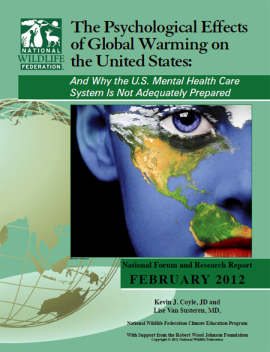The National Wildlife Federation regards human beings as just another form of wildlife to be managed.
A year ago this month, the US National Wildlife Federation published a curious, 60-page document titled The Psychological Effects of Global Warming, And why the U.S. Mental Health Care System is not Adequately Prepared.
Yes, that’s right. Wildlife activists devoting time and money to writing reports about mental health. Climate change sure does odd things to people.
The tone of this report is amateurish and the logic is strained. For example, the word “suicide” appears 29 times and particular attention is paid to suicides by armed forces personnel. We’re told that America should embrace “alternate renewable sources of energy” for the sake of its military, and that
Our national need to put these young people in harm’s way would also decline if we were simply more energy efficient. How will we answer these service members’ questions about why we didn’t work harder at fixing this problem?
As if a wildlife group writing about mental health wasn’t silly enough, these people also believe they’re in the business of promoting “social justice.” The preface to the report tells us its purpose is to raise awareness:
by exposing the emotional side of the issue, to find the place in our hearts that mobilizes us to fly into action, forewarned, determined, relentless. It also is a call for professionals in the mental health fields to focus on this, the social justice issue of all times… [bold added]
Elsewhere, the report compares climate change to child abuse:
We must ask…if the call for climate change action is any less compelling than stopping child abuse or protecting the sick. In the final analysis inflicting the burden of climate change on the vulnerable is an immoral act that puts future generations in mortal danger. [bold added; page xiii]
The authors of this report believe that those with psychological training should be using this training to produce politically correct outcomes. For example, page 31 declares:
The discipline of psychology can be used to uncover what the barriers are to reducing our carbon footprint and adopting a green lifestyle.
The following page says:
We need people to learn about and support positive steps at home and in their communities in order to lower carbon footprints.
Indeed, from the perspective of the National Wildlife Federation, we humans are just another form of wildlife to be managed. Members of the public aren’t presented as voters capable of making up their own minds. The public isn’t viewed as the final authority to whom politicians must answer.
Instead, we’re errant children who require shepherding. Thus, the report declares that:
America’s leaders should be trained to use the most persuasive educational tools to influence people to change and to sustain their changes. [p. xiii]
Similarly, businesses are urged to
present environmentally sound products that will steer the consumer to make ethical purchases. [bold added, p. 34]
And then there’s the downright offensive. According to this report, poor people
need professionals and the mental health care community to help them voice their outrage. [p. 34]
Source: http://nofrakkingconsensus.com/2013/02/22/managing-human-wildlife/



